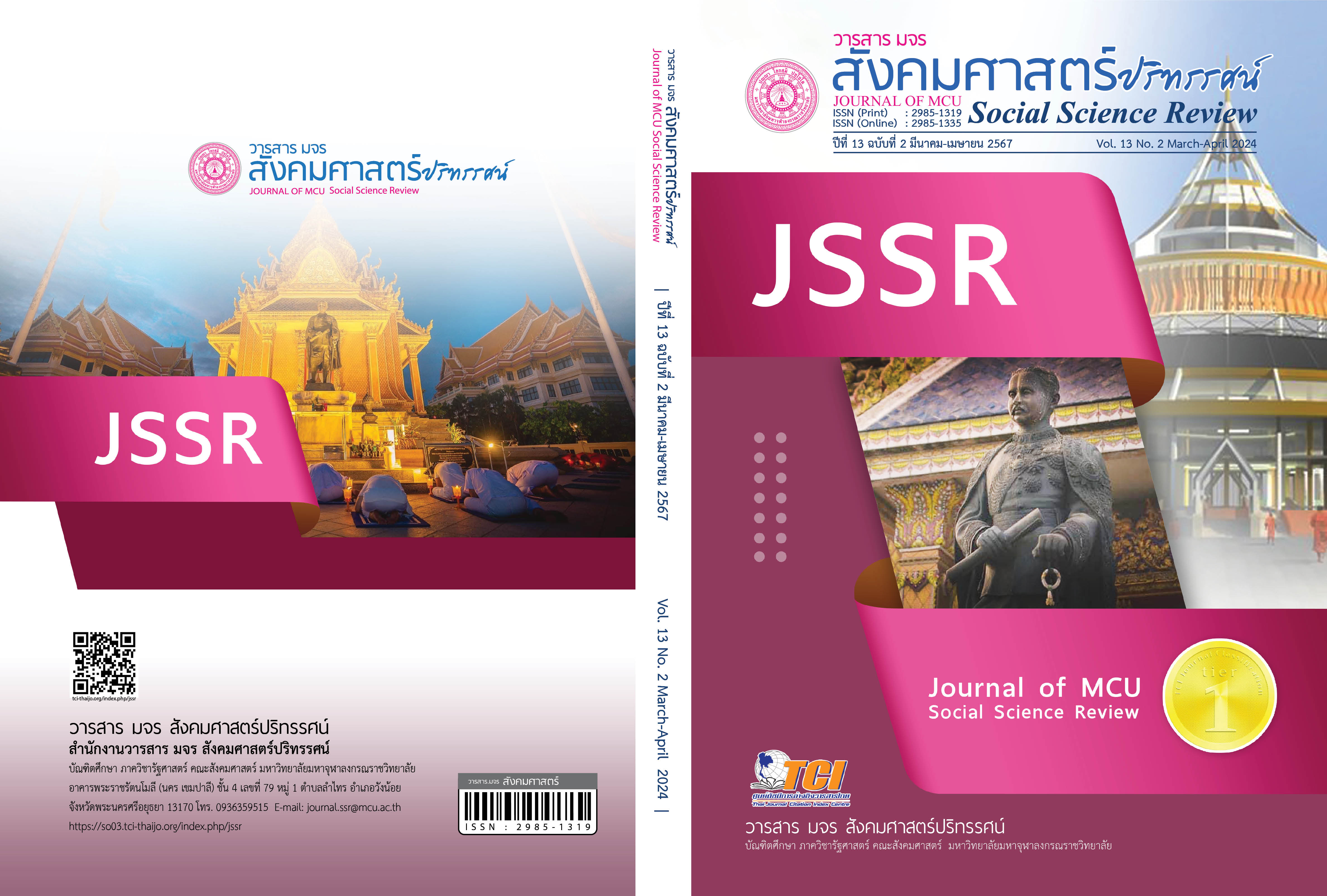บทบาทของวัดในการพัฒนาชุมชนให้เข้มแข็ง : กรณีศึกษาวัด ในเขตอำเภอบ้านสร้าง จังหวัดปราจีนบุรี
คำสำคัญ:
บทบาท, วัด, การพัฒนาชุมชนให้เข้มแข็งบทคัดย่อ
บทความวิจัยนี้มีวัตถุประสงค์ 1. ศึกษาบทบาทของวัดในการพัฒนาชุมชนให้เข้มแข็ง : กรณีศึกษาวัดในเขตอำเภอบ้านสร้าง จังหวัดปราจีนบุรี 2. ศึกษาแนวทางในการพัฒนาบทบาทของวัดในการพัฒนาชุมชนให้เข้มแข็ง : กรณีศึกษาวัดในเขตอำเภอบ้านสร้าง จังหวัดปราจีนบุรี ซึ่งงานวิจัยมีระเบียบวิธีวิจัยเป็นการวิจัยแบบผสานวิธี ระหว่างการวิจัยเชิงปริมาณและการวิจัยเชิงคุณภาพ การวิจัยเชิงปริมาณใช้แบบสอบถาม ถามบทบาทของวัดในการพัฒนาชุมชนให้เข้มแข็งใช้การวิเคราะห์ข้อมูลด้วยสถิติพรรณนา หาค่าร้อยละค่าเฉลี่ย และส่วนเบี่ยงเบนมาตรฐานส่วนการวิจัยเชิงคุณภาพ ใช้การเก็บข้อมูลโดยการสัมภาษณ์เจาะลึก จากผู้ให้ข้อมูลสำคัญ จำนวน 15 รูป/คน วิเคราะห์ข้อมูลด้วยวิธีการวิเคราะห์เนื้อหา
ผลการวิจัยพบว่า 1. บทบาทของวัดในการพัฒนาชุมชนให้เข้มแข็ง : กรณีศึกษาวัดในเขตอำเภอ บ้านสร้าง จังหวัดปราจีนบุรี ตามความคิดเห็นของประชาชนและพระสงฆ์ในภาพรวม อยู่ในระดับมาก เมื่อพิจารณาเป็นรายด้าน พบว่า พระสงฆ์มีบทบาทในการพัฒนาชุมชนในระดับมาก ทั้ง 4 ด้าน โดยมีค่าเฉลี่ยจากมากไปหาน้อย ได้แก่ ด้านพัฒนาวัฒนธรรม ด้านพัฒนาสิ่งแวดล้อม ด้านพัฒนาสังคม และด้านพัฒนาเศรษฐกิจ 2. แนวทางในการพัฒนาบทบาทของวัดในการพัฒนาชุมชนให้เข้มแข็ง: กรณีศึกษาวัดในเขตอำเภอบ้านสร้าง จังหวัดปราจีนบุรี ประกอบด้วย แนวทางการพัฒนาสังคม พระสงฆ์ต้องส่งเสริมพระพุทธศาสนา อบรมคุณธรรมจริยธรรม แนวทางการพัฒนาเศรษฐกิจ ให้ประชาชนประกอบอาชีพสุจริตไม่เบียดเบียนผู้อื่นและจัดให้มีการฝึกอบรมให้ประชาชนเกิดความรู้ ความเข้าใจ สามารถพึ่งตนเองได้ แนวทางการพัฒนาวัฒนธรรม พระสงฆ์สืบสานรักษาและต่อยอดวัฒนธรรม คิดถึงประโยชน์ส่วนรวมและด้านพัฒนาสิ่งแวดล้อม พระสงฆ์ทำความสะอาดวัดให้มีความเป็นระเบียบเรียบร้อย ไม่เบียดเบียนสิ่งแวดล้อมเพื่อความยั่งยืนต่อไป
เอกสารอ้างอิง
กรมการพัฒนาชุมชน. (2563). วัดกับการพัฒนาชุมชน อำเภอบ้านสร้าง จังหวัดปราจีนบุรี. สืบค้น 20 มีนาคม 2566, จาก https://district.cdd.go.th/bansang/
กรมการศาสนา กระทรวงวัฒนธรรม. (2550). โครงการศึกษาบทบาทพระสงฆ์กับการพัฒนาคุณธรรมจริยธรรม ตามแนวปรัชญาเศรษฐกิจพอเพียง. กรุงเทพฯ: กรมการศาสนา กระทรวงวัฒนธรรม.
กิตติทัศน์ ผกาทอง. (2560). บทบาทผู้นำสงฆ์กับการพัฒนาชุมชน.วารสาร มจร สังคมศาสตร์ปริทรรศน์, 6(2), 441-452.
จำนงค์ อดิวัฒนสิทธิ์. (2532). สังคมวิทยา. กรุงเทพฯ: โรงพิมพ์จุฬาลงกรณ์มหาวิทยาลัย.
พรชัย พันธุ์ธาดาพร. (2559). บทบาทพระสงฆ์ต่อการพัฒนาชุมชน ในจังหวัดพระนครศรีอยุธยา. สืบค้น 20 มีนาคม 2566, จาก https://shorturl.asia/J2VI4
พระครูธรรมธรนิเทศ อภิญาโณ และพระครูสุนทรเจติยาภิวัฒน์ (ชัยวัฒน์ สุทฺธจิตฺโต). (2559). บทบาทของวัดในการเสริมสร้างให้เกิดสันติสุขในชุมชน. วารสารสันติศึกษาปริทรรศน์ มจร, 4(ฉบับพิเศษ), 82-90.
พระครูพิศิษฏ์ประชานาถ (นนฺทิโย ประยูร). (2560). บทบาทการพัฒนาชุมชนของวัดอินทาราม อำเภออัมพวา จังหวัดสมุทรสงคราม. วารสาร มจร สังคมศาสตร์ปริทรรศน์, 6(2 ฉบับพิเศษ), 439-455.
พัชราวดี ตรีชัย. (2552). การวิเคราะห์ความเป็นชุมชนเข้มแข็งของหมู่บ้านหนองกลางดง ตำบล ศิลาลอย อำเภอสามร้อยยอด จังหวัดประจวบคีรีขันธ์ (ดุษฎีนิพนธ์รัฐประศาสนศาสตร์ดุษฎีบัณฑิต สาขาวิชาศิลปะศาสตร์). กรุงเทพฯ: มหาวิทยาลัยเกริก.
วรรณธรรม กาญจนสุวรรณ. (2553). กระบวนการจัดการชุมชนเข้มแข็ง: รูปแบบ ปัจจัย และตัวชี้วัด. วารสารรัฐศาสตร์, 8(2), 119-158.
สรรเกียรติ กุลเจริญ. (2558). การเปลี่ยนแปลงของวัฒนธรรมท้องถิ่น: ศึกษากรณีงานประเพณีสงกรานต์ พระประแดง อำเภอพระประแดง จังหวัดสมุทรปราการ (ดุษฎีนิพนธ์ปรัชญาดุษฎีบัณฑิต สาขาวิชาไทยศึกษา). ชลบุรี: มหาวิทยาลัยบูรพา.
ดาวน์โหลด
เผยแพร่แล้ว
รูปแบบการอ้างอิง
ฉบับ
ประเภทบทความ
สัญญาอนุญาต
ลิขสิทธิ์ (c) 2024 วารสาร มจร สังคมศาสตร์ปริทรรศน์

อนุญาตภายใต้เงื่อนไข Creative Commons Attribution-NonCommercial-NoDerivatives 4.0 International License.
เพื่อให้เป็นไปตามกฎหมายลิขสิทธิ์ ผู้นิพนธ์ทุกท่านต้องลงลายมือชื่อในแบบฟอร์มใบมอบลิขสิทธิ์บทความให้แก่วารสารฯ พร้อมกับบทความต้นฉบับที่ได้แก้ไขครั้งสุดท้าย นอกจากนี้ ผู้นิพนธ์ทุกท่านต้องยืนยันว่าบทความต้นฉบับที่ส่งมาตีพิมพ์นั้น ได้ส่งมาตีพิมพ์เฉพาะในวารสาร มจร สังคมศาสตร์ปริทรรศน์ เพียงแห่งเดียวเท่านั้น หากมีการใช้ภาพหรือตารางหรือเนื้อหาอื่นๆ ของผู้นิพนธ์อื่นที่ปรากฏในสิ่งตีพิมพ์อื่นมาแล้ว ผู้นิพนธ์ต้องขออนุญาตเจ้าของลิขสิทธิ์ก่อน พร้อมทั้งแสดงหนังสือที่ได้รับการยินยอมต่อบรรณาธิการ ก่อนที่บทความจะได้รับการตีพิมพ์ หากไม่เป็นไปตามข้อกำหนดเบื้องต้น ทางวารสารจะถอดบทความของท่านออกโดยไม่มีข้อยกเว้นใดๆ ทั้งสิ้น





